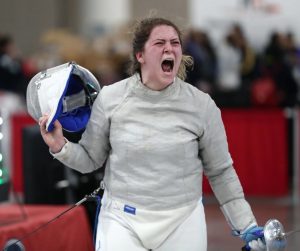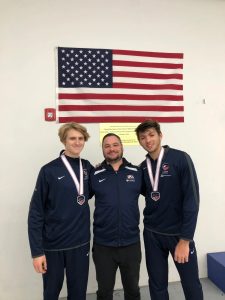- Slug: Sports-Phoenix Fencing, 1,600 words.
- Photos available (thumbnails, captions below)
By Brevin Monroe
Cronkite News
TEMPE – One figured his connection to Luke Skywalker meant he was destined to be a fencer. Another got hooked on the sport after watching a children’s TV show where the actors performed for “The Tingling Brothers Circus.”
The athletes who pass through the doors of the Phoenix Fencing Academy start the sport for a variety of reasons, and more than a few leave as champions.
Fencing might not be the first sport people think about when it comes to the Olympics – basketball, swimming, track and field or one of the combat sports like wrestling or boxing get more of the acclaim.
That often leaves fencing on the periphery of the discussion and despite its lack of mainstream popularity, the athletes who participate must possess far more skill than athleticism, making it one of the more technical sports.
One of Arizona’s most successful connections to the sport is through the Phoenix Fencing Academy. Owner, founder and coach Will Becker III founded the Academy in 2018 with his wife Sabrina after his father, Bill, also an established fencing coach, moved to Florida and closed the previous school in the area.
“We decided to open up our own facility to continue to work with the kids in Arizona, as well as wanting to come with our own in our own name and our own separate brand, so to speak,” Becker said.
The Academy opened five years ago and has already seen tremendous success from its students on both the national and international stages. But for Becker, coaching fencing was not something he had ever anticipated doing full time.
“I started coaching at that time as a job so I had money coming in. And as I was doing that, honestly, a few of the kids I was coaching started doing pretty well. Then I started becoming a little more intrigued about it,” Becker said.
Three of Becker’s most successful students include Luke Linder, a junior at Notre Dame, Columbia sophomore Jackson McBride and Cornell alum Gillian Harrill.
Linder’s path to fencing was forged by a demonstration he saw at school when he was 7 years old and immediately fell in love with the sport.
“Seven years old, I loved Star Wars, you know, my name was Luke, it just hit the whole narrative. And so I told my parents you guys got to sign me up for this,” Linder said.
Even though he was still a year too young to start fencing (he needed to be 8), Linder’s mother signed him up for the sport the following year and he “never looked back.”
This proved to be the right choice as Linder is credited with being Becker’s first student to taste success, winning Y12 and Y14 individual national championships and representing the U.S. in over 10 events around the world.
In addition, the Chandler native won the 2021 NCAA men’s individual Sabre national championship. His sister Kara, a Notre Dame graduate student, won the women’s individual Sabre national championship on the same day right before Luke’s final match, making them the only sibling national champions in collegiate fencing.
“I’m like, ‘OK, I got to do this for the family. There’s a lot of people I got to do this for,’” Linder said. “It was a lot of motivation, rather than pressure. It was an awesome experience. And I’m hoping we can do it again.”
Luke and Kara have one final shot at becoming two-time sibling national champions when the NCAA Men’s and Women’s Fencing Championships take place starting Thursday in Durham, North Carolina. Notre Dame will be looking for its third straight team national title as well.
Luke is also the fifth-ranked junior fencer in the world and second in the U.S., meaning a shot at making the Olympic team is a very real possibility for the Notre Dame fencer.
“I was close in the running for Tokyo (2020 Olympics) a little bit,” Linder said. “It’s something that’s always been like, that’s as high as you can go for it. It’s such a huge honor. But yeah, it’s definitely in the cards, and it’s definitely an opportunity, you can’t really turn down.”
Harrill is another national champion whose fencing roots stretch back to the Phoenix Fencing Academy. Harrill, also a native of Chandler, attended Cornell University and won the Division I-A individual women’s Sabre national championship in 2017.
“It was pretty intense. I think the hardest part was fencing my teammate in the final because we were really good friends. And you have to be able to still be competitive against someone who you love dearly, and they know you really well, and you know them really well,” Harrill said of Kaitlyn Becker, her competitor in the final and Will’s younger sister.
“It’s really hard to defend someone when you both know each other’s tricks, because we’ve probably fenced each other every single day. And suddenly, it’s the difference between a gold and silver medal in the final,” she said.
Harrill looks back fondly at her time with the Phoenix Fencing Academy, saying she holds tremendous respect for Becker both as a coach and a life mentor.
“I saw Will more than I saw my own dad in high school,” Harrill said with a laugh. “Will was definitely like a father figure where he would give advice, even outside of fencing. He always tells me the truth. He’s never sugarcoating things, and he’s always believed in me too.”
Even as she moved on from college fencing, Harrill remained connected to the fencing world even after making a leap of faith and moving to New York City with no job or apartment. There she connected with a friend and got a job as a fencing coach at a local high school and club.
“I didn’t realize how much fencing as a network, even if I wasn’t competing, would still help me out in my career, or at least like in my livelihood. Because suddenly I was on the other side of fencing and it felt really interesting to be coaching someone against a coach who I had known and who had known me since I was 12 years old, and suddenly be treated like a peer,” Harrill said.
McBride, another successful product of the Academy’s, had by far the most interesting path into the sport, but one that is worthy of a few laughs.
“I got into fencing because of an episode of a show called iCarly, ‘The Fencin’ Bensons’,” McBride said. “And I asked my parents to sign me up, and they said if you find one in Arizona [a place to fence] we’ll take you and I did, so they took me and I enjoyed it.”
That episode of a children’s TV show released in 2008 sparked McBride’s decade-plus-long fencing career, which has seen him represent the U.S. on the international stage, where he won an individual bronze medal at the 2019 Sosnowiec Junior World Cup in Sabre and multiple other team medals at the international level.
Despite his success, McBride’s first few years were very tough on him mentally. Especially watching another local fencer succeeding nationally with a different club in the area.
“I was sitting there for, I want to say, three years. I was just like, I was not doing too well. Then we saw Luke Linder doing really well also in Arizona and put two and two together that this club has produced really good fencers,” McBride said of the Phoenix Fencing Academy. “And finally my parents let me go and said that, ‘Yeah this is a really good coach.’”
McBride, currently a sophomore at Columbia University in New York, just wrapped up his second season of collegiate fencing after taking ninth at the NCAA Northeast Regional in Cambridge, Massachusetts and still has two years of eligibility remaining.
Like Harrill, McBride holds a very high opinion of his fencing coach, referring to Becker as “family” or an “older brother,” descriptions Linder also used when discussing the man who introduced them to the fencing family.
“It started out as almost like an older brother kind of thing, he’s so easy to connect with,” Linder said of Becker. “And it’s not just for me, it’s like all the kids at the club, you know. He just really tries to make it fun for everybody, and he does. It’s amazing how he can captivate such a young audience and just motivate them to do well.”
Despite these three successful fencers coming from the Academy, they are the outliers throughout Arizona as the fencing community in the Valley overall is not very large.
“As far as a competitive sport, there’s not a lot of competitive fencing going on in Arizona, there’s a bit. My goal, as far as Arizona fencing is concerned, is to try to increase the competitive level of the sport here,” Becker said.
Becker also wants to expand his club throughout the Valley because he believes that in order to develop better fencers, the area as a whole needs more competition.
“There is a little bit of other Sabre that happens in the metro area of Phoenix, but not much. And that makes it rather difficult to develop your own program when you have to send 7, 8, 9 or 10 year olds off to California to compete. The parents are a little less likely to want to pay for that essentially, upfront, which I absolutely understand,” Becker said.
Despite the difficulty of developing a program, Becker has done a great job already producing an NCAA National Champion as well as multiple international and national medalists. But there are still other goals to compete, and Becker believes the sky’s the limit for his students.
“I have lofty goals, you know, I want to send fencers to the Olympics, which we’ve had some that have become close. I want to be national champion at every level, obviously,” Becker said. “We’ve attained some of those goals, but we’re not done.”
For more stories from Cronkite News, visit cronkitenews.azpbs.org.

